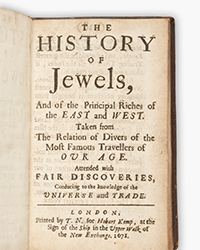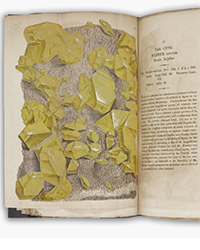We asked Mr. Addison whether he was satisfied with the results. He responded, “There were two measures, in my mind, of success. First, I wanted to be sure that Mr. McMurtry was pleased. I think he sensed that. I'll never forget when he said to me, 'You gave me exactly what I wanted. I made the right choice with you. Your staff did a great job as well.' That is when I breathed the biggest sigh of relief. Larry has become a great friend to me. He's such a nice man that I couldn't bear the thought of letting him down. The second measure of success was the feedback from the bidders. I, as well as the staff, were stopped in the street countless times by bidders who just wanted to thank us and tell us we had done a great job and that they had a great time. That was a great feeling. Our consignor was happy, and our bidders were happy, thus, we were happy.
“In terms of dollars, the total hammer price came in around $200,000. Selling so many books in such a short time probably depressed the prices a bit. On the other hand, we sold somewhere between 250,000 to 275,000 books in two days; that alone is no small feat. Out of just over 1,530 lots, about 10% or so didn't sell. And for many of those, there was no clear reason why. There were some great books in all of those lots. I think the volume of books that were sold played a part in some of them not selling. Some lots sold for $50 and some sold for much more. I recall one bringing $1,100. But looking at the numbers, it averaged out to about $140 per lot. The highlight of the sale was the collection of erotic typescripts which sold to Between the Covers for $2,750, plus premium. The most odd thing to me was that the Goodspeed's* sign did not sell. The opening bid was $2,500 for that item. I was shocked there were no takers at that price.
“Larry and I walked into building number 2 where there were many lots of fiction. We were standing there looking at what sold and what didn't sell. By far, the fiction section fared the worst. Larry looked at a sold lot and then at an unsold lot right next to it and said, 'It doesn't make much sense. This lot is just as good as this other one. I don't know why a person bought this one but wouldn't buy this other one.' Larry later stated that perhaps the Serendipity* sale was flooding the market with fiction at the moment.
“Personally, I wanted this sale to be a shelf-lot sale unlike any other. Larry also wanted it to be a memorable event. I think we succeeded in pulling off an auction that will be very tough to duplicate and even more difficult to top. Future shelf-sales may very well be measured against The Last Book Sale by many of the bidders who attended. After this auction, I have to think that the typical auction will seem downright boring.”
Continuing on the future of auctions, Mr. Addison emphasized the importance of turning them into events, not mere rattling off of lots. “Our challenge in the future will be to make our other auctions enjoyable events as well by offering bidders that little bit extra. I think there is a tendency to focus on the business of auctions, and it is easy to forget that auctions are as much entertainment as business. An auction is supposed to be fun. Many people come to auctions for the fun of it but end up bidding and buying. I think that when people have fun, they feel less inhibited and more free to bid. In a time when people can just as easily bid online from the comfort of their home, we want to give people a reason to show up on the auction floor, get involved, participate physically and not just virtually online, and get back in touch with how fun auctions can be.”
As to whether this formula works, we can only look at the results. Small numbers of books can readily be sold, but it is a huge, and sometimes frightening prospect booksellers with large inventories face these days when they seek to pare down inventory or exit the business. Some have found it an enormous challenge just to find someone to take large numbers of books away. On two days in the mid-summer heat of a tiny town in rural Texas, Mr. Addison managed to auction off more than a quarter of a million books. What more is there to say?
So what does the future hold for Larry McMurtry and Booked Up? Mr. Addison explained, “As for the future of Booked Up, they are still in business. I'm not sure Larry would know what to do if he didn't own a bookstore of some sort. Building number 1 is staying open, and it contains around 125,000 to 150,000 books. So, it's no small store!” As for Michael Addison and auctioneers Addison and Sarova, it's back home to Macon, Georgia, for the fall. Their next book auction is scheduled for November 17, and there is much to be done to prepare for what will include both individual antiquarian and collectible books and another 2,000 titles in shelf lots. And, in keeping with the philosophy of the South's only dedicated book auction house, the sale also promises to be an “event.”
Auctioneers Addison and Sarova may be found online at www.addisonsauction.com.
*Goodspeed's was the legendary Boston book store that was open through most of the 20th century. Serendpity Books was the shop of the late Peter Howard from which an enormous inventory is being sold by Bonham's. That fiction would be a slow-moving category is not surprising to us as that has been a particularly challenging field of late.
Kurt Zimmerman, who attended and purchased at The Last Book Sale, has kindly provided us with a link to his detailed description of this one-of-a-kind event. Here it is: www.bookcollectinghistory.com.



![<b>Heritage, Dec. 15:</b> John Donne. <i>Poems, By J. D. With Elegies on the Author's Death.</i> London: M[iles]. F[lesher]. for John Marriot, 1633. <b>Heritage, Dec. 15:</b> John Donne. <i>Poems, By J. D. With Elegies on the Author's Death.</i> London: M[iles]. F[lesher]. for John Marriot, 1633.](https://ae-files.s3.amazonaws.com/AdvertisementPhotos/8caddaea-4c1f-47a7-9455-62f53af36e3f.jpg)
























